Fighting Hunger From the Front Lines
The COVID-19 pandemic dramatically increased the number of New Yorkers who experience food insecurity. Here’s how NewYork-Presbyterian stepped up to bring healthy options to patients in need.
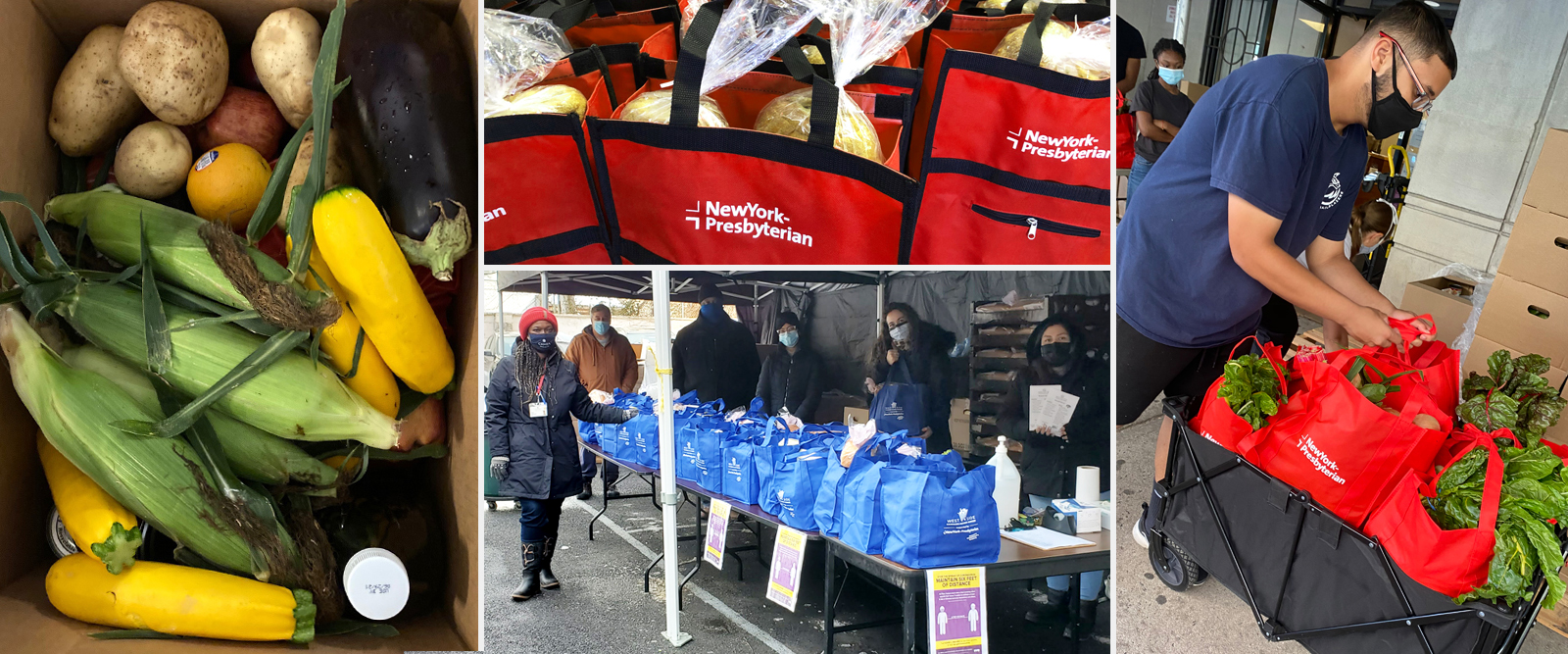

In the early months of the pandemic, healthcare workers across NewYork-Presbyterian were struck by a problem that increasingly came to light during conversations with their patients.
“People were getting furloughed or losing their jobs, and a lot of people would come into the hospital either without medications or rationing their insulin because they had to decide between food or medicine,” says Aarti Patel, a physician assistant at NewYork-Presbyterian Lower Manhattan Hospital.
Before the COVID-19 outbreak, 1.2 million New Yorkers were already struggling to afford and gain access to nutritious food to feed themselves and their families, according to City Harvest, one of the city’s largest nonprofits dedicated to emergency food distribution. Food and nutrition, research shows, directly affect health and social outcomes, such as obesity, cardiovascular disease, diabetes, maternal depression, and academic performance.
Since the COVID pandemic hit New York City in March 2020, the number of people facing food insecurity is estimated to have increased by a staggering 38%, with one in four children unsure of where their next meal may come from.
“Rates of food insecurity skyrocketed, and people who were never food insecure before joined many others experiencing this issue,” says Emma Hulse, a manager in NewYork Presbyterian’s Division of Community and Population Health who oversees the hospital’s food distribution program, Food Farmacy.
Prior to the pandemic, Food Farmacy — a collaboration between NewYork-Presbyterian’s Ambulatory Care Network; Choosing Healthy and Active Lifestyles for Kids (CHALK), NewYork-Presbyterian’s obesity prevention program; and the West Side Campaign Against Hunger, a local nonprofit that works to alleviate hunger — ran a free mobile food market for at-risk patients in the Washington Heights community. In response to the growing food insecurity crisis, NewYork-Presbyterian worked with Nido de Esperanza, Rena Day Care Centers Inc., and the Mexican Coalition for the Empowerment of Youth and Families to expand the program’s food distribution efforts in northern Manhattan from one site to four and also teamed up with organizations in Lower Manhattan, Queens, Brooklyn, and Westchester to increase the program’s geographical reach and provide food to more patients and community members in need.
Between March 16, 2020, and April 15, 2021, NewYork-Presbyterian went from serving 190 families to nearly 7,000 households across the region, says Hulse. In total, the program has distributed more than 1.1 million pounds of healthy food in the past year.
“There are vegetables, fruit, bread, beans, tortillas… I’m grateful for everything.”— Marjolin Rojas, participant in lower Manhattan
“COVID has devastated communities with high [health] disparities. Unfortunately, in addition to COVID, these same communities — and many of our patients and their families — are facing hunger,” says Andres Nieto, director of Community Health Education and Outreach in NewYork-Presbyterian’s Division of Community and Population Health, which works to enhance holistic health by improving the social determinants of health that can affect a person’s overall well-being, such as housing, transportation, and food in at-risk communities.
Patients and community members are referred to the Food Farmacy program by their NewYork-Presbyterian healthcare provider or community-based organization staff if they screen positive for food insecurity. They will then meet with a food distribution staff member at one of the local organizations, who not only helps participants enroll in the Food Farmacy but also assists in connecting people to social support services and other non-food-related needs.
“When you sit down and speak to the patients who are coming in for various reasons, you get a deeper understanding of the social factors and disparities that exist,” says Patel. “If you can better understand the patients you take care of, you can do a better job of taking care of what their bigger needs might be, like basic housing, access to food, sorting out immigration issues, and finding accessible transportation.”
“Throughout the COVID-19 crisis, NewYork-Presbyterian has demonstrated how healthcare institutions can strengthen the emergency food system,” says Alyson Rosenthal, chief program officer for West Side Campaign Against Hunger. “WSCAH is proud to be able to bring its dignity-focused model of emergency food distribution to NewYork-Presbyterian and its incredible network of community agencies, which together helped significantly ramp up food distribution efforts during a time of great need.”
Here’s how NewYork-Presbyterian is working with the West Side Campaign Against Hunger, Feeding Westchester, and other local nonprofits to connect patients with vital food services throughout the New York City area and Westchester:
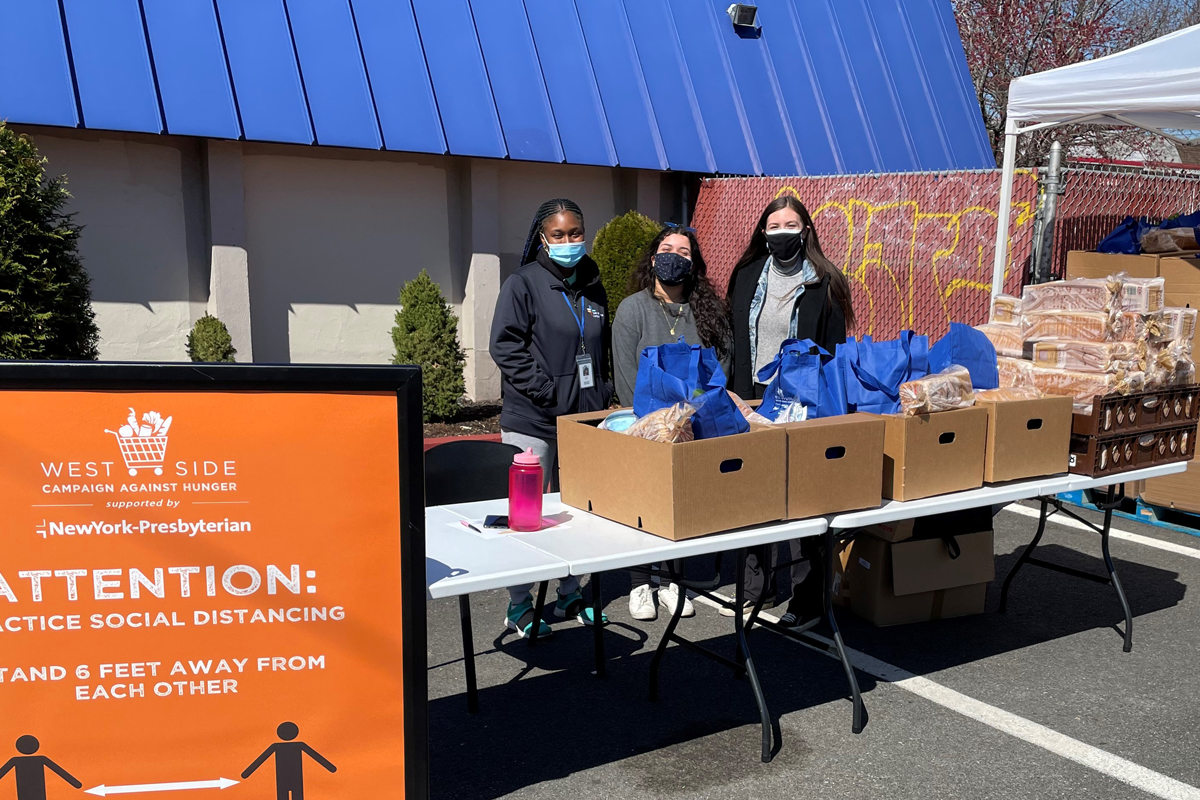
Boxes of food ready for distribution in Queens.
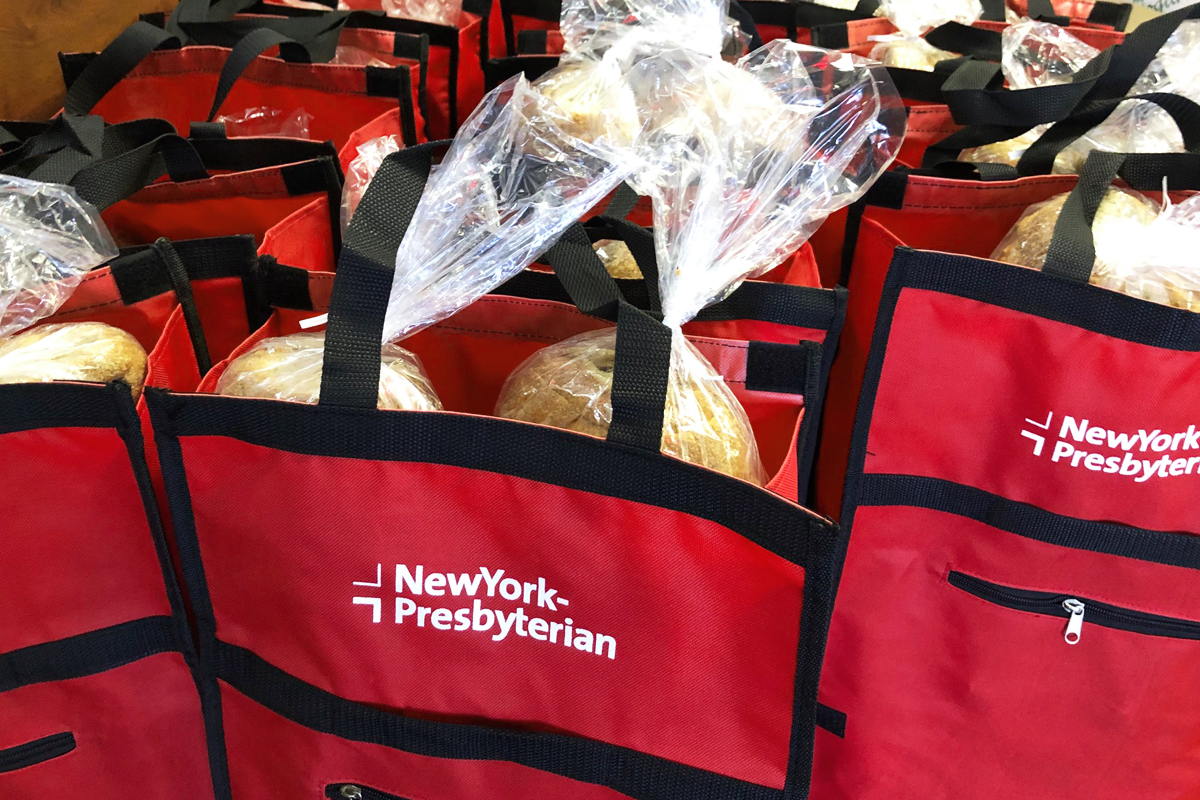
Food Farmacy bags in upper Manhattan.
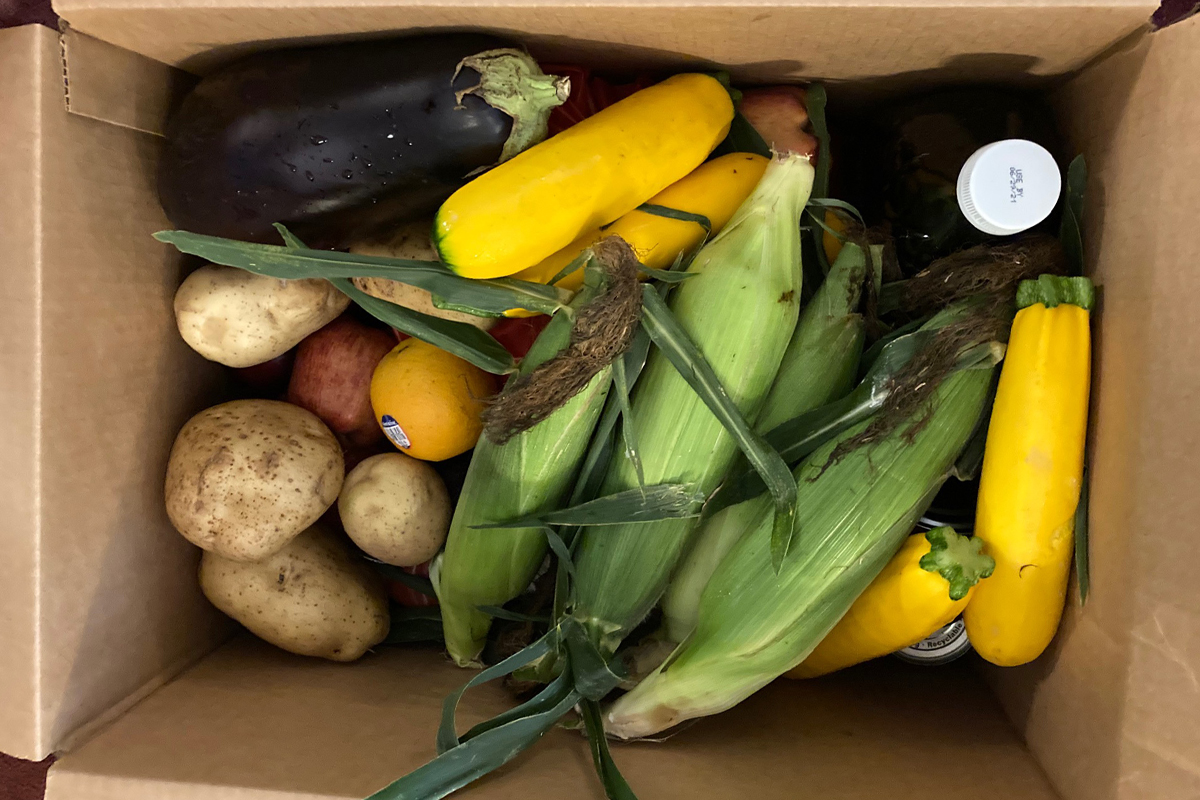
Fresh fruits and vegetables for Food Farmacy participants in upper Manhattan.
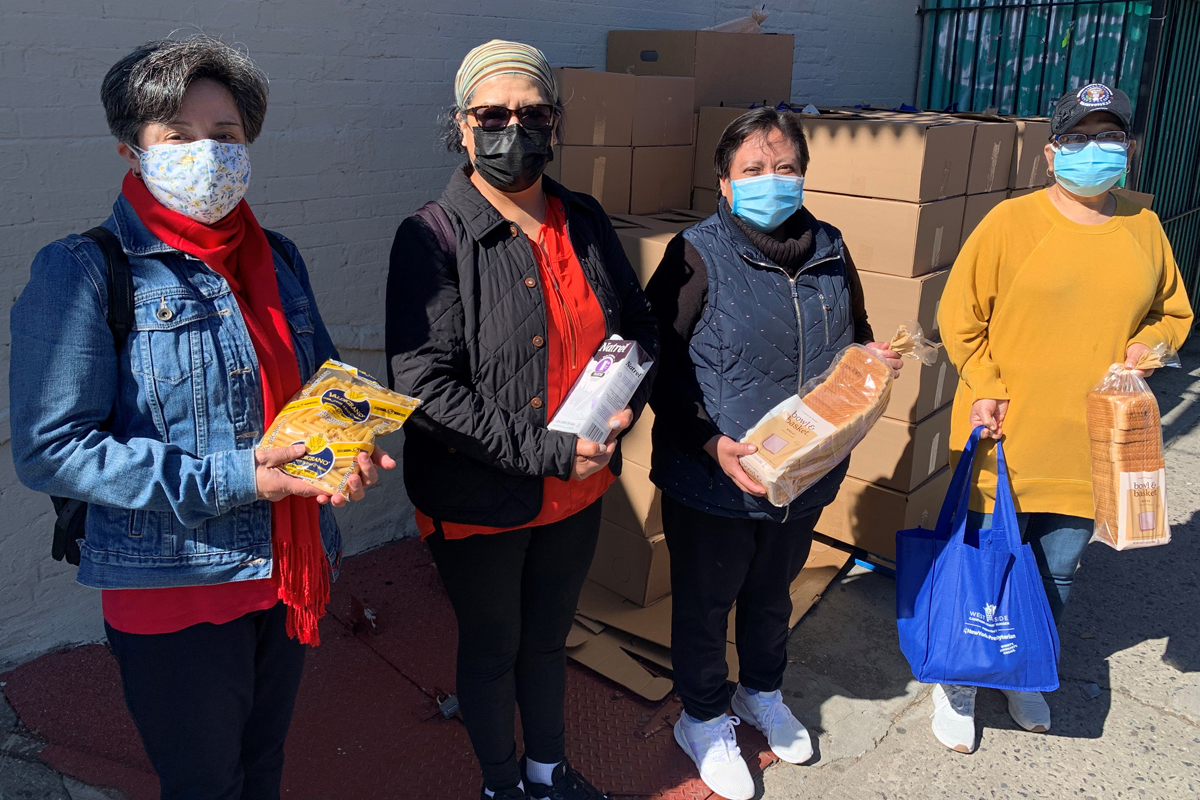
Showing some of the items for Food Farmacy participants in Brooklyn.
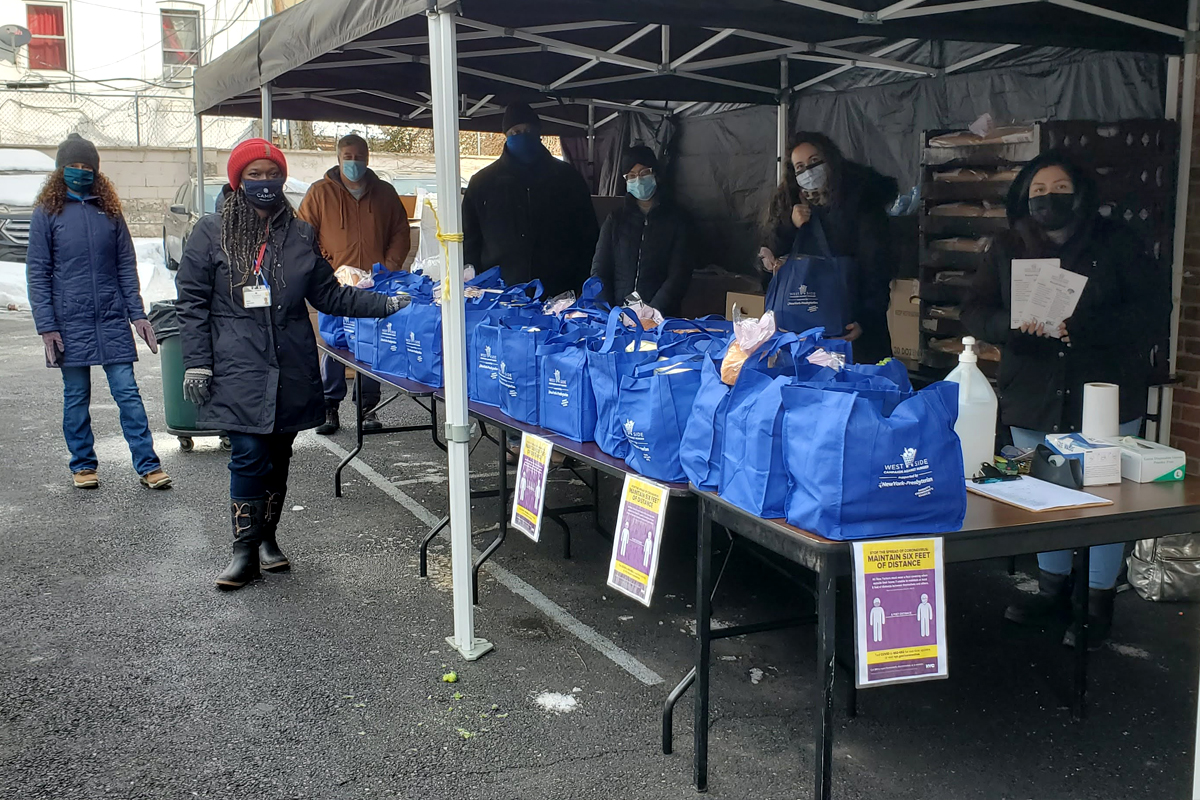
Packed bags ready for distribution in Brooklyn.
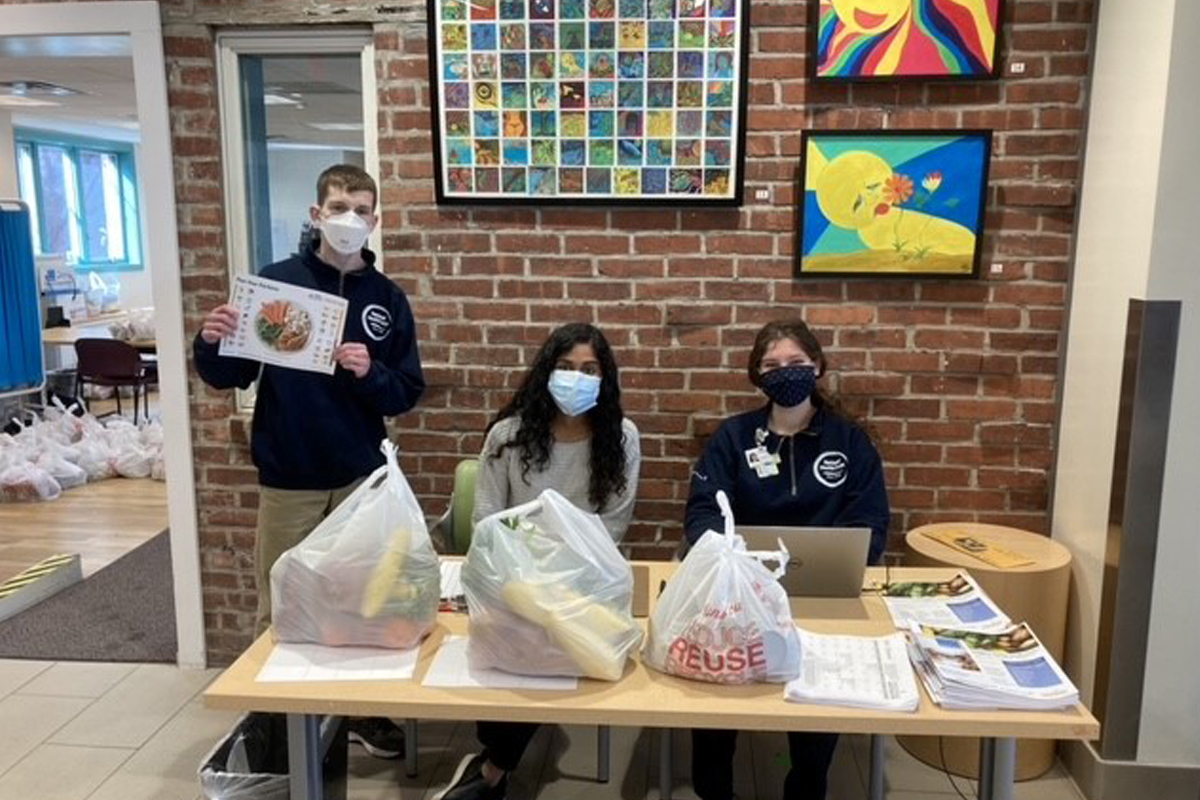
Volunteers in Westchester with Food Farmacy bags.
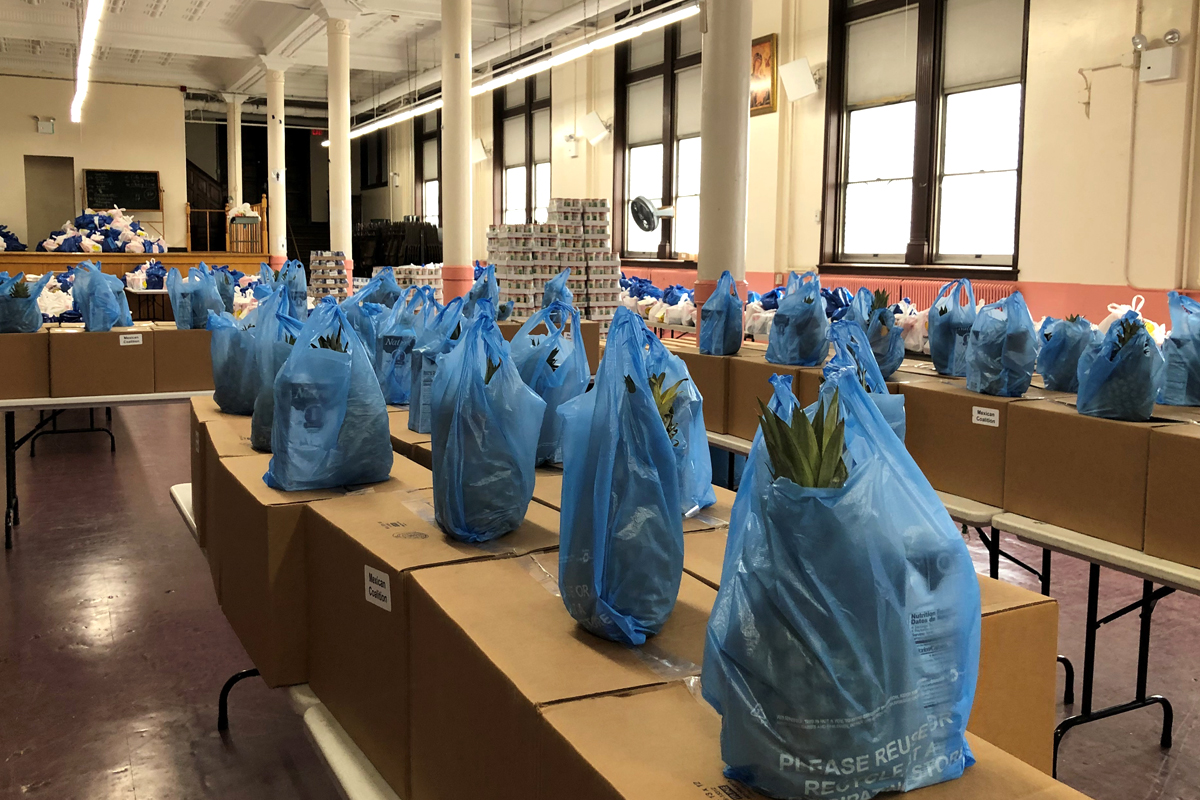
Prepared Food Farmacy bags in upper Manhattan.
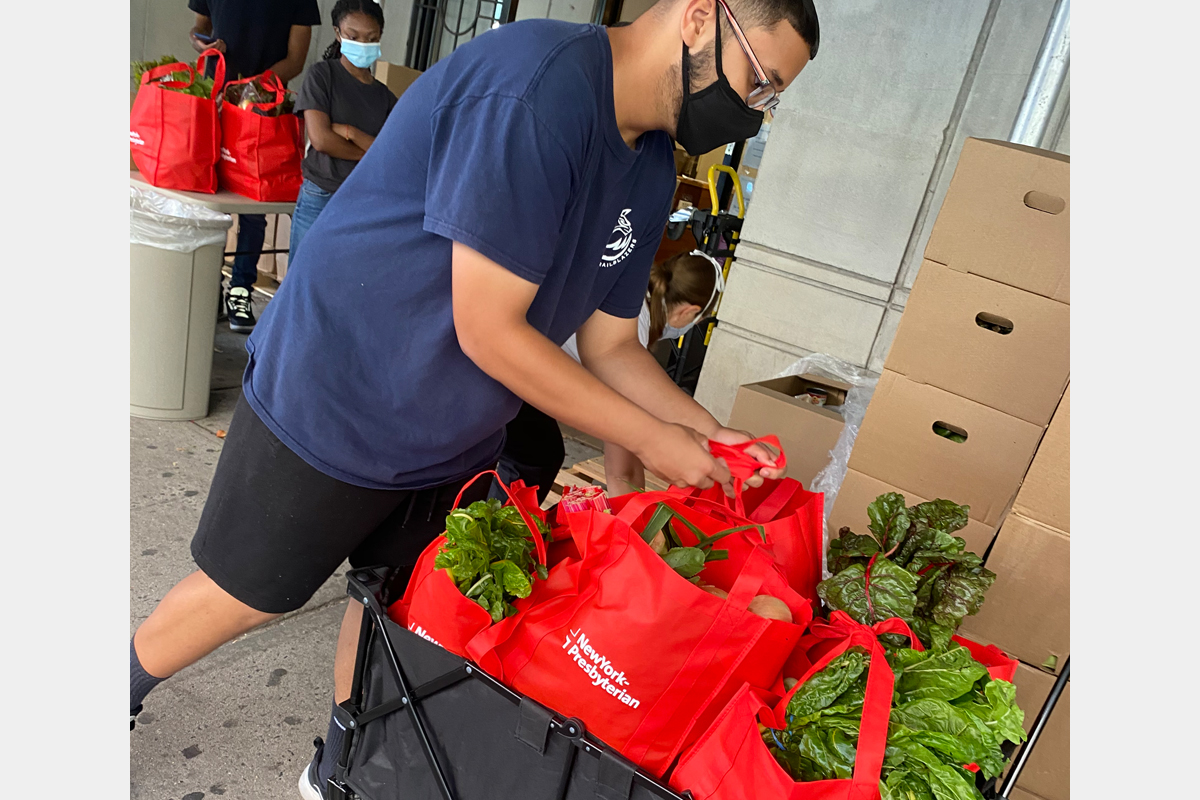
Preparing bags for delivery in upper Manhattan.
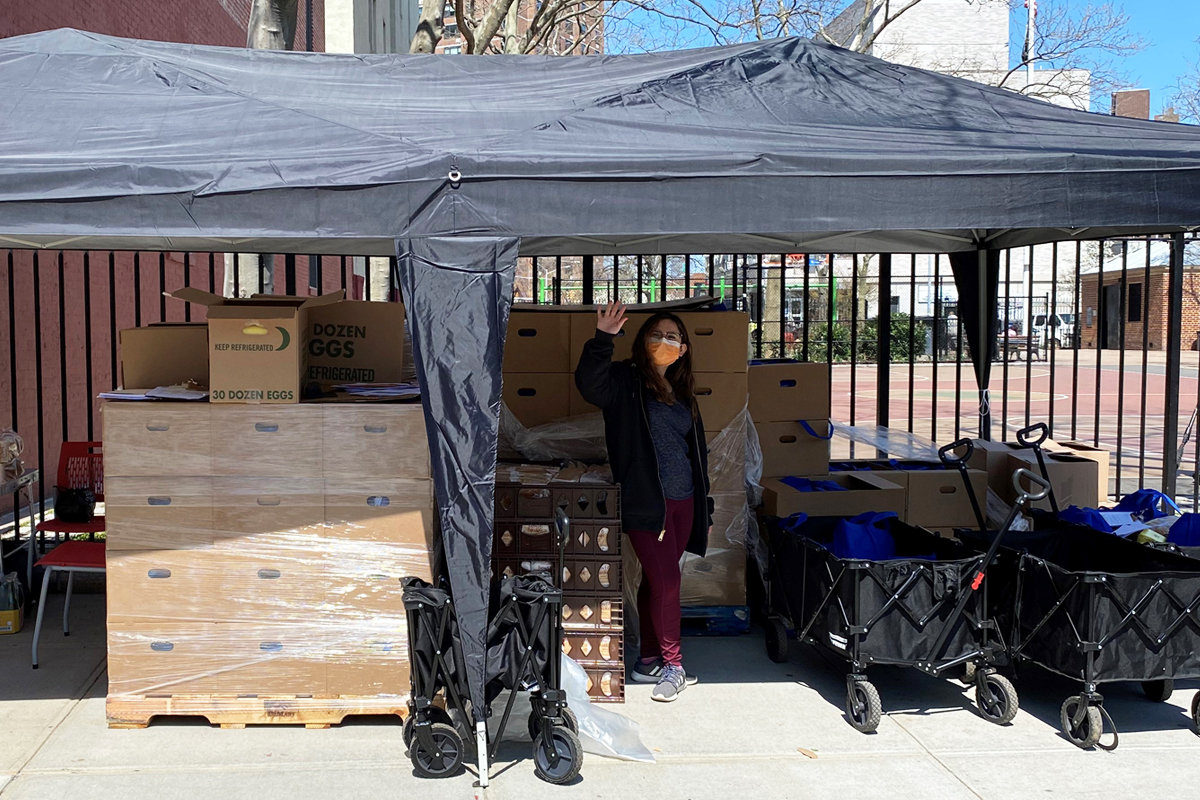
Preparing Food Farmacy distribution in lower Manhattan.
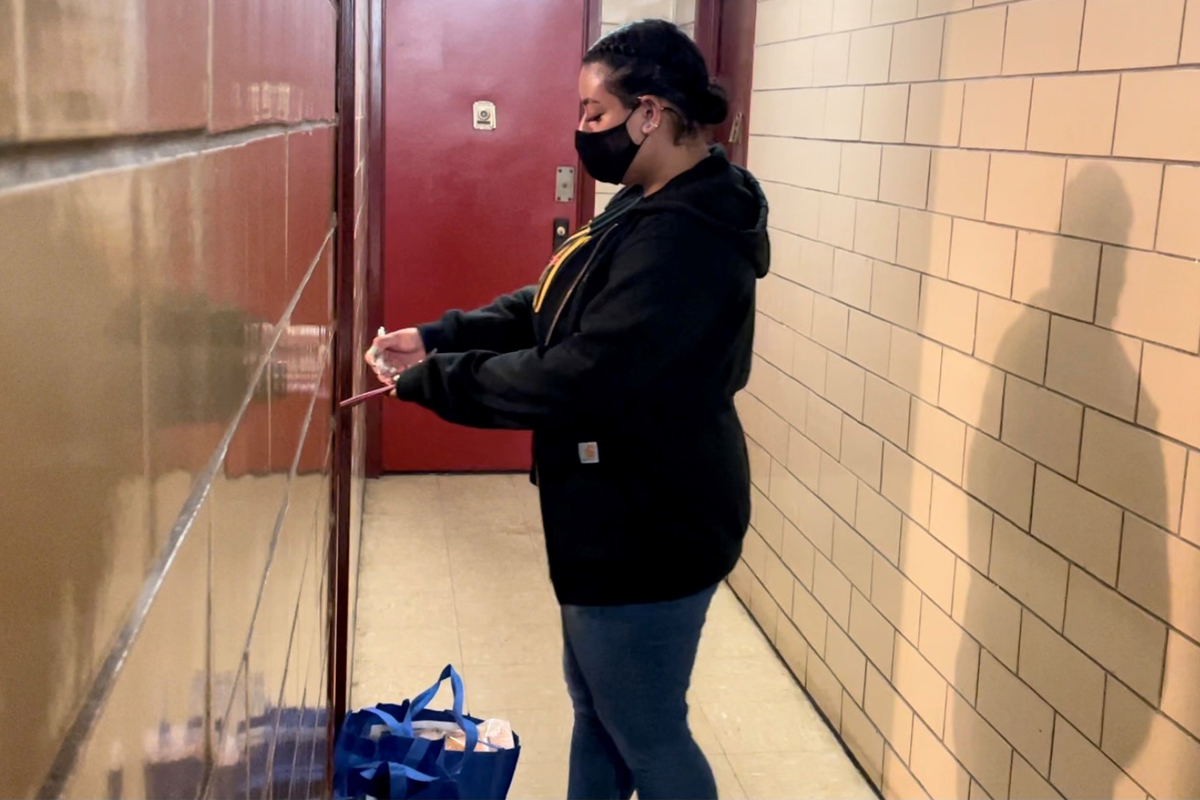
Food Farmacy delivery in lower Manhattan.
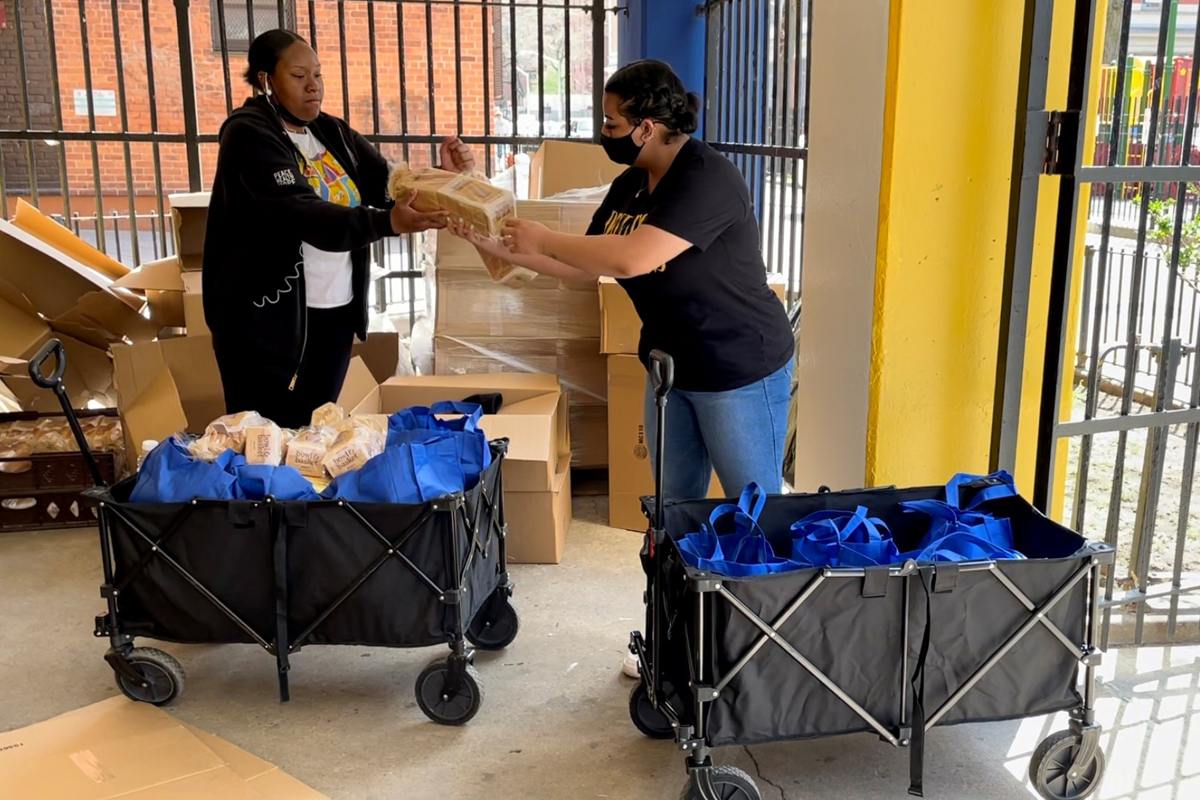
Organizing Food Farmacy deliveries in lower Manhattan.
Lower Manhattan
When Henry Street Settlement launched a help line for its community on the Lower East Side during the pandemic, “We found that around 90 percent of the people we spoke to were facing food insecurity,” says Jeremy Reiss, executive vice president, partnerships and innovation at Henry Street Settlement.
As the primary Meals on Wheels provider in Lower Manhattan, Henry Street Settlement already had an efficient system for food delivery. With the help of NewYork-Presbyterian and West Side Campaign Against Hunger, it developed the Lower East Side Mobile Market program, which now delivers 40 pounds of healthy groceries every other week to 200 families in the local community.
Henry Street Settlement has also created job opportunities for local youth who are hired to distribute the food, and they’ve set up a help line to better respond to the neighborhood’s needs.
For Marjolin Rojas, who has an 8-year-old son and lives with asthma, the food from the program has made a big difference.
“There are vegetables, fruit, bread, beans, tortillas — basic food that I really need for my health. And my son loves the pasta,” she says. “I’m grateful for everything.”
Queens
When COVID-19 hit, Make the Road New York, which provides social services and community support throughout the city’s five boroughs, closed its food pantry in Jackson Heights for two weeks to implement new protocols that would make the location safe for their staff, volunteers and community members. The day it reopened, “people lined up outside of our doors with a line that ran almost around the block, which showed the need that was present in our community,” says Arline Cruz, the associate director of health programs at Make the Road New York.
The additional support provided by NewYork-Presbyterian Queens, says Cruz, has allowed the organization to identify and engage with more participants who might benefit from the health and social services they provide. Now, every Friday, West Side Campaign Against Hunger delivers boxes of fresh produce and shelf-stable foods to the Queens food pantry to help meet the demand. In addition, Make the Road launched a bike brigade with the organization Mutual Aid to deliver groceries to those who can’t pick them up.
As a result of all their efforts, the nonprofit has served nearly 4,000 households in the community over the past year. Along with Make the Road, NewYork-Presbyterian Queens also works with Public Health Solutions in Queens, which is focused on pediatric and prenatal patients and their families. They have 100 families enrolled in the program, offering twice-monthly food distribution.
Brooklyn
CAMBA is one of the largest social service agencies in Brooklyn, with existing food pantries serving neighborhoods such as Flatbush, Crown Heights, and Bedford-Stuyvesant. Their deep connection to the community made CAMBA a natural ally for NewYork-Presbyterian Brooklyn Methodist Hospital and its medical group offices as they worked together to address the growing food insecurity needs in the area.
Patients and community members are invited to visit the CAMBA food pantries twice a month to pick up about 40 pounds of seasonal fruits and vegetables, along with pantry staples like pasta, beans, and tuna. CAMBA also offers home delivery for those who are unable to make the trip to pick up their food. Loren Avellino, a manager in community affairs for NewYork-Presbyterian, adds that West Side Campaign Against Hunger gets feedback from participants to help ensure the food is culturally relevant to the populations they serve, and they also offer recipes that participants can try at home that incorporate the monthly groceries. NewYork-Presbyterian also recently launched a biweekly distribution site with the Mexican Coalition for the Empowerment of Youth and Families, serving about 100 families a month in Sunset Park.
“I have been introduced to vegetables that in the past l may have shied away from, such as kale and collard greens,” said one Brooklyn resident. “In fact, my eating habits have greatly improved. l now roast vegetables like delicata squash, which, like its name, is simply delicious.”
Another participant said that as a breastfeeding mom, this proper nutrition is crucial: “Having fresh vegetables and fruits delivered to us takes away the worry of having to make sure I eat healthy and nutritious foods to pass to my baby.”
Westchester
Feeding Westchester, the county’s leading nonprofit hunger relief organization, provided good, nutritious food to nearly 300,000 people each month throughout 2020 and the height of the pandemic — more than twice as many individuals served per month as prior to COVID-19.
To meet the growing need, NewYork-Presbyterian and Feeding Westchester worked together to set up a pilot program modeled after Food Farmacy in October to support at-risk families in Peekskill and Mount Vernon. Both NewYork-Presbyterian Lawrence Hospital and NewYork-Presbyterian Hudson Valley Hospital are facilitating their food distribution programs with the Mount Vernon Neighborhood Health Center and Sun River Health, respectively.
Individuals with nutritional needs are referred to the program by a health provider, and participants can bring home bags of whole-grain food, low-sodium and low-sugar groceries, and fresh produce. Since launching in October, the Westchester program has distributed 12,010 pounds of food to 96 families.
Across all New York City and Westchester, “I have been in awe of our team during these challenging times,” says Nieto. “They’ve done an amazing job working with community-based organizations to address these challenges and care for the communities we serve.”
For more information on the Food Farmacy and NewYork-Presbyterian’s food distribution programs around the New York City region, visit the CHALK website.
Additional Resources
Click the links below to learn more about the community organizations that are part of NewYork-Presbyterian’s food distribution efforts:
West Side Campaign Against Hunger, https://www.wscah.org/
Nido de Esperanza, https://nidodeesperanzanyc.org/
Mexican Coalition, https://www.coalicionmexicana.org/en
Rena Day Care Centers Inc., http://rena-childcare.org/home.html
Make the Road New York, https://maketheroadny.org/
Public Health Solutions, https://www.healthsolutions.org/
Henry Street Settlement, https://www.henrystreet.org/
CAMBA, https://camba.org/
Feeding Westchester, https://feedingwestchester.org/
Mount Vernon Neighborhood Health Center, https://www.mvnhc.org/
Sun River Health, https://www.sunriver.org/

